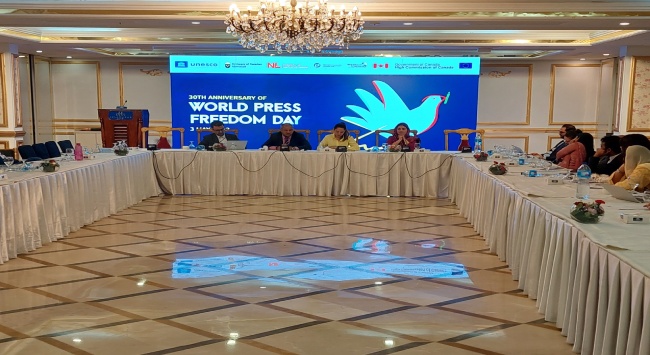Fatal Silence: Press Freedom and Perilous Journalism in Pakistan
Imran Ahmed, Charukeshi Karikalan
25 July 2024Summary
In the 2024 World Press Freedom Index, Reporters Without Borders ranked Pakistan at 152 out of 180 countries, underscoring a severe decline in press freedom. The government’s heightened repression of online dissent – marked by frequent internet shutdowns, throttling of online access and social media suspensions – has significantly curtailed free expression. This decline is compounded by a troubling rise in journalist violence, with seven reporters killed in the first half of 2024, setting an unprecedented record. In response, non-governmental organisations and international organisations have condemned these developments and launched initiatives to enhance press freedom and journalist safety. Despite these efforts, the environment for journalists remains perilous, reflecting a broader trend of shrinking media space amid ongoing political and social turmoil.
Pakistan’s journalism landscape is fraught with challenges, where journalists navigate a precarious balance between reporting and state scrutiny, particularly from powerful military and intelligence agencies. Despite a historically vibrant media environment, reporters face constraints in criticising the military and intelligence apparatus, contributing to a climate of fear and self-censorship. Government-controlled media regulators and vaguely worded laws, such as the Prevention of Electronic Crimes Act, are wielded to suppress dissent rather than protect journalistic integrity. This environment – a patchwork of frequent target killings, impunity for perpetrators and stifled free speech and investigative journalism – has made Pakistan one of the most dangerous places for journalists, with Reporters Without Borders ranking it at 152 out of 180 countries in the 2024 World Press Freedom Index.
This restrictive climate coincided with a record number of journalist killings in 2024, with seven fatalities reported in the first half of the year alone. Khalil Jibran, a veteran journalist in Khyber Pakhtunkhwa, was brutally murdered in June 2024, having faced threats from militants for years, including a grenade attack in 2014 and the discovery of an undetonated explosive device under his car in 2017. His killing follows a pattern of targeted attacks, exemplified by the recent murders of journalists like Saad Ahmed in Karachi and Hasan Zaib in Khyber Pakhtunkhwa, illustrating the pervasive risks faced by media personnel.
These actions against press freedom are not isolated but function within a larger framework of the government’s attempts to limit transparency and thwart accountability. During the recent elections, the Pakistan Telecommunication Authority, chaired by retired General Hafeezur Rehman, deserted its promises to maintain internet services as the interior ministry imposed mobile service suspensions and widespread internet blackouts across multiple regions, including Islamabad, severely hindering the journalists’ ability to report on electoral proceedings. Social media and the internet were shut down as former prime minister Imran Khan’s party, Pakistan Tehreek-e-Insaf, engaged in virtual rallying. Instances of media exclusion from polling stations, such as in Lahore and Karachi, where journalists from outlets like Al Jazeera were barred from coverage, further illustrate systematic attempts to control the flow of information and limit media scrutiny.
Detentions and disappearances have become commonplace in Pakistan contributing to an atmosphere of constant fear and worry. Imran Riaz Khan, a prominent Pakistani journalist and YouTube channel host, has been arrested numerous times on a range of charges that his lawyer describes as “fake and fabricated”. More recently, nearly 50 journalists and YouTubers were summoned for questioning in February 2024 over their criticism of the Supreme Court’s judges. Numerous journalists have also fled Pakistan in recent years, driven by security fears, and worsened by a polarised and hyperpartisan media landscape and financial instability within independent news outlets. According to data from the United States-based Committee to Protect Journalists, 64 journalists have been killed in connection with their work in Pakistan since 1992.
Looking ahead, as threats against journalists in Pakistan escalate, particularly in the border regions with Afghanistan, the need for urgent action to safeguard press freedom and journalist safety cannot be overstated. However, the staggering levels of impunity surrounding journalist killings underscore a critical failure in accountability and protection by the authorities. Pakistan was ranked 11th on the Committee to Protect Journalists’ 2023 Global Impunity Index. Saroop Ijaz of the Human Rights Watch rightly points out that journalists are often viewed as adversaries rather than agents of free expression, perpetuating a climate of fear and censorship. Pakistani leadership has responded with statements emphasising the importance of a free press. President Asif Ali Zardari has stressed the need for an environment free of intimidation for journalists to express opinions, highlighting constitutional guarantees of press freedom. Prime Minister Shehbaz Sharif echoed these sentiments, declaring freedom of the press as fundamental to democracy and urging collaboration between media and government for accurate and responsible reporting.
However, the recent enactment of the Punjab Defamation Law further compounds challenges, raising serious concerns about its potential to suppress critical reporting. In response, journalists and civil society groups have challenged this law in court, asserting its unconstitutionality and advocating for press freedom. It is imperative for Pakistani authorities to uphold constitutional guarantees of press freedom, prosecute perpetrators of violence against journalists and repeal laws that threaten media independence. Failure to act decisively will only exacerbate the dangers faced by journalists and undermine democratic principles in Pakistan.
. . . . .
Dr Imran Ahmed is a Research Fellow at the Institute of South Asian Studies (ISAS), an autonomous research institute at the National University of Singapore (NUS). He can be contacted at iahmed@nus.edu.sg. Ms Charukeshi Karikalan is a Research Intern at the same institute. She can be contacted at isav32@partner.nus.edu.sg. The authors bear full responsibility for the facts cited and opinions expressed in this paper.
Pic Credit: Twitter @PJNPakistan
-
 More From :
More From :
-
 Tags :
Tags :
-
 Download PDF
Download PDF


